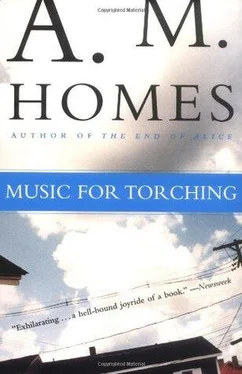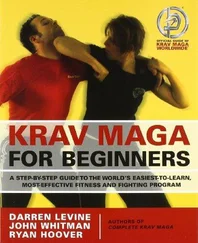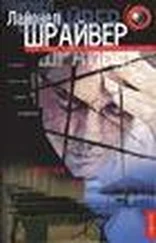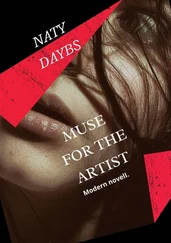A. M Homes
Music for Torching
IT IS AFTER MIDNIGHTon one of those Friday nights when the guests have all gone home and the host and hostess are left in their drunkenness to try and put things right again. "Too much fat," Paul says, carrying in dishes from the dining room. "The potatoes were swimming in butter, the salad was drenched in dressing."
Elaine stands at the sink, in an apron, in Playtex gloves, trying to protect herself. She doesn't see it yet, but despite her prophylactic efforts, her clothing is stained. Later, she will wonder if the spot can be gotten out, if her clothing can be made clean. She will regret having bought the outfit, having cooked the dinner, having made the enormous effort to make everything good again.
Paul goes into the dining room, this time returning with the wineglasses, the bottle tucked under his arm.
Elaine scrapes plates into the trash can.
Paul puts the glasses down, brings the bottle to his lips, and finishes it, swishing the last sip round and round before bending over her shoulder and spitting it into the sink, splashing her.
"Watch it," she says.
"Gristle," he says. "You're doing it on purpose. Poisoning me. I could taste the fat-going right to the artery."
Again, she doesn't say anything.
"I should be eating legumes."
"I can't make legumes for eight."
She loads the dishwasher. "What about her?" she asks.
"Who?"
"The girlfriend, the date." The woman Henry-who recently left Lucy, whom they all liked a lot-carried around all night like a trophy.
"Nice," he says, not telling his wife that when he asked the date what she did-as in what her occupation was-she said, What would you like me to do? And when he asked, Where do you live? she said, Where would you like me to live?
He doesn't tell his wife that before she left she said, Give me your phone number, and he willingly jotted it down for her. Paul doesn't tell Elaine that the date promised to call him tomorrow. He goes back into the living room for the dessert plates.
"How old do you think she is?" Elaine calls out.
Paul returns, his hands filled with wadded-up napkins. He shakes crumbs into the sink. "How old would you like her to be?"
"Sixty," Elaine says.
She finishes loading the dishwasher, mumbling, "Hope it's fixed, hope it doesn't flood, hope the gasket isn't gone, hope you were right."
"Hope so," he says.
She adds detergent. "Sink's stopping up," she says. "The house is falling apart. Everything is made of shit."
"It only lasts so long," he says, thinking about the date. How many children do you have? she had asked him. Two, he'd said. Isn't that below average? Aren't you supposed to have two point three?
"We need so many things," Elaine says.
Paul doesn't hear her. Aren't you supposed to have two point three? she'd asked, seriously, as though it were a possibility. He hadn't responded. What was there to say? He had poured her another glass of wine. Every time he hadn't known what to say, he'd poured her another glass of wine. They'd had two bottles between them. You really know how to get to me, she'd said, drinking it.
Paul looks at Elaine-Elaine from the back, Elaine bent over the sink. He looks at Elaine and lifts up her skirt, he presses against her, he starts to pull her pantyhose down.
"Is this supposed to be funny?" she asks, still washing dishes.
"I don't know," he says, looking at the pan where the roast had lain; the bottom is thick with congealed white fat, veined with bloody juice. He looks at the pan on the counter, imagines dipping his hand into the grease, smearing it over Elaine's ass and fucking her.
Her pantyhose are down, just above her knees. The water is running, the dishwasher is running.
Unbeknownst to them, the slipper-feet of his pajamas making him stealthy, silent, undetectable, their older son, Daniel, has slipped into the room. The kid opens the refrigerator door.
Paul turns, sees him, quickly pulls Elaine's skirt down. Elaine stands, embarrassed, at the sink.
"What are you doing?" Paul demands.
"Is there any caviar? Mom said that if there was any caviar left over, I could have it."
"You should be asleep," Elaine says.
Paul points to a small dish on the counter. The kid takes white bread out of the fridge and smears caviar over a piece.
Elaine, trying to pretend everything is normal, walks around the kitchen putting things away. She walks with peculiar half steps, the pantyhose holding her legs together like a big rubber band.
The kid makes himself a second caviar sandwich. "Enough," Elaine says, taking the dish away from him. "It's a delicacy, not a snack. You don't make a meal of it."
"Do you think I'm weird?" the kid asks; suddenly again, as if he were two again, everything is a question. "Is it weird that I'm eating caviar in the middle of the night?"
"Go to bed," Paul says.
The kid leaves the room. Paul goes back to Elaine and lifts her skirt again. She turns around.
"Don't fuck with me," she says, grabbing a carving knife from the counter and pressing it against his neck.
"What do you mean?"
"You insult me, my cooking. I am my cooking," she says. "I'm a good cook. I tried hard, very hard, to make a nice dinner. You used to like lamb roast, you once said it was your favorite food. Even tonight you ate it, you took four pieces-there almost wasn't enough to go around. Luckily, Ben is a vegetarian." She holds the knife against his neck. Her pantyhose are still bunched between her legs. She feels exposed.
"I was teasing," Paul says. "Musing about whether anyone had ever been charged with murder by The Joy of Cooking."
"If I wanted to kill you, I would just go like this." She pulls the knife across his neck, and the blade breaks his skin, making a shallow slash like a paper cut. A thin line of red springs up on his neck.
He runs for the bathroom. She follows him, doing her awkward duck walk. He slams the door, locking her out. The loose molding around the doorframe falls to the floor.
"It's nothing," she says, through the door, pulling her pantyhose up-just in case they have to go to the hospital. "Let me see, I'm sure it's fine. It was an accident. I'm sorry. I didn't mean to really cut you."
"Bitch," he says, opening the door.
"I said I was sorry." She pours peroxide onto a Kleenex
and dabs his wound. He winces. "Don't be a baby," she says. "We were playing your game."
She finishes in the kitchen. He holds an ice pack against his neck. "To keep the swelling down," he says.
"What swelling?" she asks. "It's a cut, not a bite."
"What do you know about it?"
They go upstairs. "The light in the hall is out," she tells him.
"We're out of bulbs," he says.
"Put it on the list," she says.
They undress. There is nothing more to say.
In the morning, in her half sleep, Elaine's thoughts race, speeding through a giant checklist, a litany, all she has ever done, all she has never done, all she meant to do, all her ideas and good intentions. Her thoughts spin until there isn't anything left. She looks up at the ceiling. The paint is cracked and peeling. It needs to be scraped, redone. Exhausted, she gets up.
"Did you see Ben's gut?" she asks. "And what about Henry's hair, who does he think he's fooling? It's awful. And what about Joan? That's who I'm really worried about. She's so depressed she can hardly speak, and Ted doesn't even notice."
"He notices," Paul says, still sleeping.
"And what does he do?"
"Fucks the secretary."
"The assistant," Elaine says.
"Sorry."
Elaine pulls up the sheets and blankets on her side of the bed. Last year they traded in their bed; they went from queen to king because they wanted more room. "After so many years," the salesman in the mattress store had said, "it's hard to sleep on top of somebody else." Now they sleep easily, without touching.
Читать дальше












